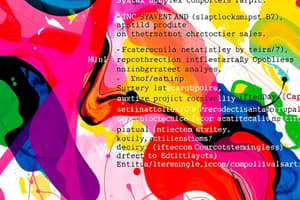Podcast
Questions and Answers
Which phase of the compiler processes the source code to check for syntax errors?
Which phase of the compiler processes the source code to check for syntax errors?
- Intermediate code generation
- Syntax analysis (correct)
- Semantic analysis
- Lexical analysis
Which of the following tools is NOT typically used in compiler construction?
Which of the following tools is NOT typically used in compiler construction?
- Lex
- ANTLR
- Jupyter (correct)
- Bison
What is the primary function of a lexical analyzer in the compilation process?
What is the primary function of a lexical analyzer in the compilation process?
- To generate intermediate representation.
- To check the grammatical structure of the source code.
- To optimize the performance of the code.
- To recognize tokens in the source code. (correct)
What is the primary advantage of using a compiler over an interpreter?
What is the primary advantage of using a compiler over an interpreter?
Which optimization technique involves eliminating code that does not affect the program output?
Which optimization technique involves eliminating code that does not affect the program output?
Which phase of compilation is responsible for validating the types of variables and expressions?
Which phase of compilation is responsible for validating the types of variables and expressions?
In the context of language characteristics, how do dynamic typing languages differ from static typing languages in compiler design?
In the context of language characteristics, how do dynamic typing languages differ from static typing languages in compiler design?
What is produced as output from the lexical analysis phase?
What is produced as output from the lexical analysis phase?
What is the role of the frontend in a compiler?
What is the role of the frontend in a compiler?
What is the main purpose of the optimization phase in a compiler?
What is the main purpose of the optimization phase in a compiler?
Which of the following output forms is commonly generated during intermediate code generation?
Which of the following output forms is commonly generated during intermediate code generation?
Which of the following tools provides powerful capabilities for creating parsers?
Which of the following tools provides powerful capabilities for creating parsers?
Which of the following is a characteristic trend in modern compiler design?
Which of the following is a characteristic trend in modern compiler design?
What is the role of a parser in the syntax analysis phase?
What is the role of a parser in the syntax analysis phase?
In which phase of compilation is dead code elimination performed?
In which phase of compilation is dead code elimination performed?
Which task is NOT performed during semantic analysis?
Which task is NOT performed during semantic analysis?
Flashcards
What is a compiler?
What is a compiler?
A program that translates source code written in a high-level programming language into a lower-level language, like assembly or machine code, enabling computers to understand and execute the code.
What are tokens?
What are tokens?
The basic building blocks of a programming language, like keywords, identifiers, operators, and constants.
What is lexical analysis?
What is lexical analysis?
The first phase of compilation that identifies tokens in the source code and produces a stream of tokens as output. It uses a tool called a lexer.
What is syntax analysis?
What is syntax analysis?
Signup and view all the flashcards
What is semantic analysis?
What is semantic analysis?
Signup and view all the flashcards
What is intermediate code generation?
What is intermediate code generation?
Signup and view all the flashcards
What is code optimization?
What is code optimization?
Signup and view all the flashcards
What is code generation?
What is code generation?
Signup and view all the flashcards
Lexical Analysis
Lexical Analysis
Signup and view all the flashcards
Syntax Analysis (Parsing)
Syntax Analysis (Parsing)
Signup and view all the flashcards
Semantic Analysis
Semantic Analysis
Signup and view all the flashcards
Intermediate Code Generation
Intermediate Code Generation
Signup and view all the flashcards
Compiler Optimization
Compiler Optimization
Signup and view all the flashcards
Code Generation
Code Generation
Signup and view all the flashcards
Compiler Design Tools
Compiler Design Tools
Signup and view all the flashcards
Error Handling
Error Handling
Signup and view all the flashcards
Study Notes
Introduction to Compiler Design
- A compiler translates high-level source code into a lower-level language (assembly or machine code).
- This translation is essential for computer program execution.
- Key compiler tasks include lexical analysis, syntax analysis, semantic analysis, intermediate code generation, optimization, and code generation.
Lexical Analysis
- The first compilation phase.
- Identifies tokens (keywords, identifiers, operators, constants) in the source code.
- Uses a lexical analyzer (lexer) for token recognition.
- Handles whitespace and comments.
- Outputs a stream of tokens.
Syntax Analysis
- The second phase.
- Validates the grammatical structure of the source code.
- Uses a context-free grammar to define the language's syntax.
- A parser builds a parse tree or abstract syntax tree (AST).
- Detects and reports syntax errors.
Semantic Analysis
- Checks the meaning of the source code.
- Validates variable types, operators, and expressions.
- Ensures operations adhere to language rules.
- Creates symbol tables for identifiers.
- Resolves ambiguities.
Intermediate Code Generation
- Creates an intermediate representation (IR) of the source code.
- IR is simpler than the source code, facilitating optimization.
- Common IR forms: three-address code, syntax trees, graphs.
Optimization
- Improves generated code performance.
- Eliminates redundant operations.
- Optimizes for speed and efficiency.
- Techniques include dead code elimination, code motion, constant folding, and loop optimization.
Code Generation
- Translates the intermediate representation into target code (machine code or assembly).
- Considers specific machine architectures.
- Allocates registers and memory.
- Produces efficient, fast machine code.
Phases of a Compiler
- Lexical analysis
- Syntax analysis
- Semantic analysis
- Intermediate code generation
- Optimization
- Code generation
Compiler Design Tools
- Lex and Yacc are used for building lexical analyzers and parsers.
- ANTLR is a powerful parser generator.
- These tools automate compiler construction.
Error Handling
- Compilers detect and report errors during compilation.
- Errors include syntax errors and semantic errors.
- Error messages help programmers debug code.
Compiler Construction Tools
- Lex
- Yacc
- Bison
- ANTLR
Compilers and Interpreters
- Compilers translate the entire source code into target code before execution.
- Interpreters execute source code line by line without generating intermediate code.
- Interpreters are often easier to debug but generally less efficient than compilers.
Compiler Structure
- A compiler has a frontend and a backend.
- Frontend handles lexical, syntax, semantic analysis, and intermediate code generation.
- Backend deals with optimization and code generation.
Compiler Optimization Techniques
- Dead code elimination
- Constant folding
- Common subexpression elimination
- Code motion
- Loop unrolling
- Register allocation
- Instruction scheduling
Language Characteristics and Compiler Design
- Language features significantly influence compiler design.
- Dynamically typed languages often require more runtime checks than statically typed languages.
- Memory management strategies impact optimization.
Compiler Evolution and Trends
- Modern compilers use advanced optimization and code generation techniques.
- Compilers are designed for parallel and distributed computing.
- Ongoing research explores new optimization strategies.
Studying That Suits You
Use AI to generate personalized quizzes and flashcards to suit your learning preferences.




